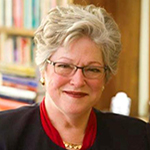By Jeff Brumley
Ongoing spiritual formation for adults at Northminster Baptist Church in Jackson, Miss., goes way beyond Sunday school. In fact, it borders on divinity school.
“Right now in our two-year study … we are studying Bible, church history and the Holy Spirit on Sunday evenings,” said Chuck Poole, the senior pastor at Northminster.

Topics covered so far in the annual Adult Studies series include the Holy Spirit as seen in the Old and New Testaments, the theology of Thomas Aquinas, the first four centuries of church history and the Reformation, Poole said.
The church also offers a weekend built around visiting lecturers, including New Testament and preaching professors, church and Baptist historians and other scholars from leading Baptist seminaries.
“Northminster has been intentional about theological formation and serious about biblical thinking,” Poole said. “It’s been a place serious about loving God with mind and heart.”
The demand is there
And it’s an approach Molly Marshall wishes more Baptist churches would take. Too many Baptist and other congregations, she said, are satisfied with little or no serious theological study beyond what they might get in Sunday school.
“There should be a movement for this because I think most church folk don’t know what they’re doing in their ecclesial life,” said Marshall, president and professor of theology and spiritual formation at Central Baptist Theological Seminary in Shawnee, Kan.
Some Christian groups are known for the deep theological and ministerial education they offer their laity, she said.
The Education for Ministry program offers Episcopalians a four-year distance learning certificate in theological education. It is built around small-group study and practice and has even been used by Christians outside the Episcopal Church — including Northminster Baptist for several years, Poole said.
Marshall said Baptist polity makes it difficult to create a single curriculum for adult theological education — and harder still to get churches to adopt it.
But the demand is there, she added.

“People are so hungry for some depth but they don’t really know where to begin,” Marshall said.
‘More than Sunday school’
The way that education is provided can take different forms, but the common denominator is to provide seminary-style education for lay people who don’t necessarily want to serve as ministers, she said.
Though some could use it to enter or enhance a Sunday school, music or other ministries, many others may take it just to learn the details and history of their Baptist faith.
“We’re talking about the kind of curriculum offered most likely at the church to enhance theological literacy and congregational leadership,” Marshall said.
“It’s theology in service of the church,” she said.
Such programs come in all different forms, Marshall said.
Some invite scholars to be theologians-in-residence, which she has done at Baptist and Presbyterian congregations. Others make arrangements with seminaries to host church members and ministers for workshops throughout the year.
In some cases, a number of congregations in an area will send lay people to weekend intensives.
Sometimes the programs offer certificates in ministry. In other cases they don’t and are geared more toward formation and discipleship.
“They are for lay persons who want a lot more than they can get in Sunday school,” Marshall said.
Connecting ‘the academic and the practical’
When those lay people express interest in advanced theological education or ministry certificates, the Cooperative Baptist Fellowship of North Carolina directs them to partner seminaries in the state, said Larry Hovis, executive coordinator.
Usually the divinity schools at Cambpell University, Gardner-Webb University and Wake Forest University will already offer something to meet that need, Hovis said.
“We’re passionate about making the connection between the academic and the practical,” said Andrew Wakefield, dean and professor of New Testament and Greek at Campbell University Divinity School.

The school provides certificate programs in Hispanic ministries, children’s and preschool ministry and another for lay music ministers, Wakefield said. These are designed to help lay volunteers “in what they are already doing” as they minister to the church in music ministry and worship,” he said.
But there is also a theological education series the divinity school offers every year and open to anyone who wishes to attend — and at no charge, Wakefield said.
It features three to four events a year. In November the Bible Studies Lectures were available “for anyone who wanted to dig deeper” into scripture and faith, he said.
The Preacher Lectures are held every spring, featuring workshops on topics like the art and task of preaching. And there is a music conference, he said.
Understanding ‘grace and charism’
Taken as a whole, these are just the kinds of events and topics that can help lay people broaden their understanding of topics — Bible, music, preaching — that many take for granted, Wakefield said.
“We are eager for people to come to take advantage of these opportunities … on how you deal with down-to-earth issues as well as the theologically profound,” he said.
Whatever form it takes, adult theological education helps Baptists be better Baptists and Christians by providing theological and historical perspective to the individuals in a congregation.
“A deeper study of theology helps us to understand the grace and the charism of our spirituality,” she said.
On the other hand, a congregation’s spirituality can be impoverished by its lack of advanced theological studies, Marshall said.
That absence of such training may also contribute to shallowness in worship and an “incapacity to discern hard contemporary moral and ethical issues,” she said.
